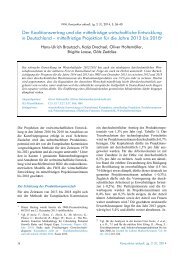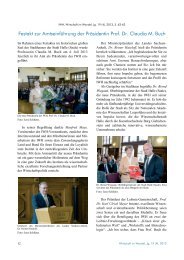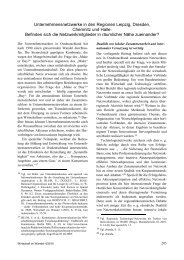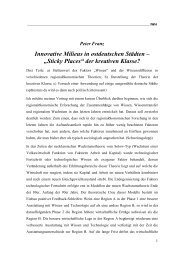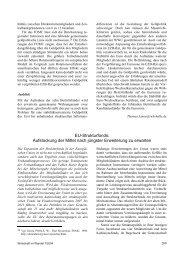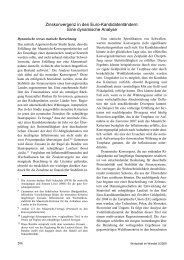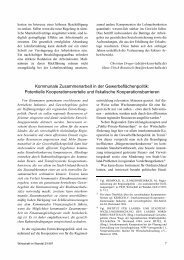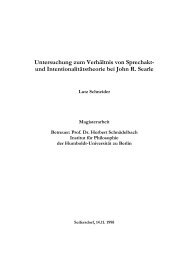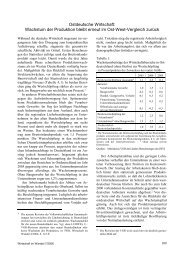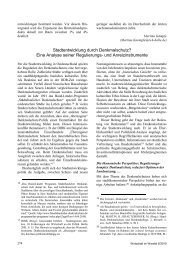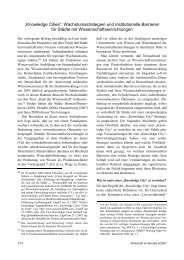Entrepreneurial Education in Germany Jutta Günther, Ilka Ritter IWH ...
Entrepreneurial Education in Germany Jutta Günther, Ilka Ritter IWH ...
Entrepreneurial Education in Germany Jutta Günther, Ilka Ritter IWH ...
You also want an ePaper? Increase the reach of your titles
YUMPU automatically turns print PDFs into web optimized ePapers that Google loves.
The courses have different target groups with respect to the student’s stage of academic<br />
career (advancement). So far, the German university system dist<strong>in</strong>guished between<br />
“Grundstudium” (basic study, usually last<strong>in</strong>g the first four semesters) and “Hauptstudium”<br />
(advanced study, usually last<strong>in</strong>g further 5 to 6 semesters). After 9 to 10 semesters the degree<br />
of “Diplom” or “Magister” is awarded. Today, the differentiation between “Grund- /<br />
Hauptstudium” and the relevant degrees are only valid for programs which have not yet been<br />
transformed <strong>in</strong>to the Bachelor or Master system. Over time, all traditional “Diplom” and<br />
“Magister” programs will phase out <strong>in</strong> favor of Bachelor and Master programs (as agreed <strong>in</strong><br />
the Bologna process <strong>in</strong> 1999). The implementation of the new programs is an ongo<strong>in</strong>g process<br />
<strong>in</strong> <strong>Germany</strong>, and universities still have students enrolled <strong>in</strong> the old as well as <strong>in</strong> the new<br />
programs. Accord<strong>in</strong>gly, for the courses <strong>in</strong>cluded <strong>in</strong> our survey we found different<br />
announcements as regards the target group (“Grundstudium”, “Hauptstudium”, Bachelor,<br />
Master, and comb<strong>in</strong>ations). What is clearly visible form the data collected is that the<br />
entrepreneurship courses are predom<strong>in</strong>antly offered for advanced students; 46.4% have<br />
explicitly been announced for the “Hauptstudium”. 12<br />
Figure 6 Target groups of entrepreneurship courses<br />
Target groups<br />
<strong>in</strong> respect of academic advancement<br />
Source: <strong>IWH</strong><br />
Frequency Percentage<br />
Hauptstudium 116 46,4%<br />
Bachelor 20 8,0%<br />
Master 11 4,4%<br />
Grundstudium 8 3,2%<br />
MBA 5 2,0%<br />
Comb<strong>in</strong>ation 73 29,2%<br />
Not announced 17 6,8%<br />
Total 250 100,0%<br />
Percentage<br />
50,0%<br />
40,0%<br />
30,0%<br />
20,0%<br />
10,0%<br />
0,0%<br />
Target Group<br />
9<br />
Hauptstudium<br />
Bachelor<br />
Master<br />
Grundstudium<br />
MBA<br />
Comb<strong>in</strong>ation<br />
Not announced<br />
In account with the fact that the majority of entrepreneurship chairs belong to economics<br />
departments, the vast majority of courses (86.4%) fall <strong>in</strong>to the category “social sciences,<br />
economics or law studies”. A much smaller number of courses is offered <strong>in</strong> the natural<br />
sciences and eng<strong>in</strong>eer<strong>in</strong>g although the potential for start-ups are particularly high <strong>in</strong> these<br />
fields. However, we do not know how many students form eng<strong>in</strong>eer<strong>in</strong>g or natural sciences<br />
<strong>in</strong>terested <strong>in</strong> an entrepreneurial activity jo<strong>in</strong> courses <strong>in</strong> the economics or social sciences<br />
departments.<br />
12 A PhD study program, comparable for example to the American system, does not exist <strong>in</strong> <strong>Germany</strong>.



